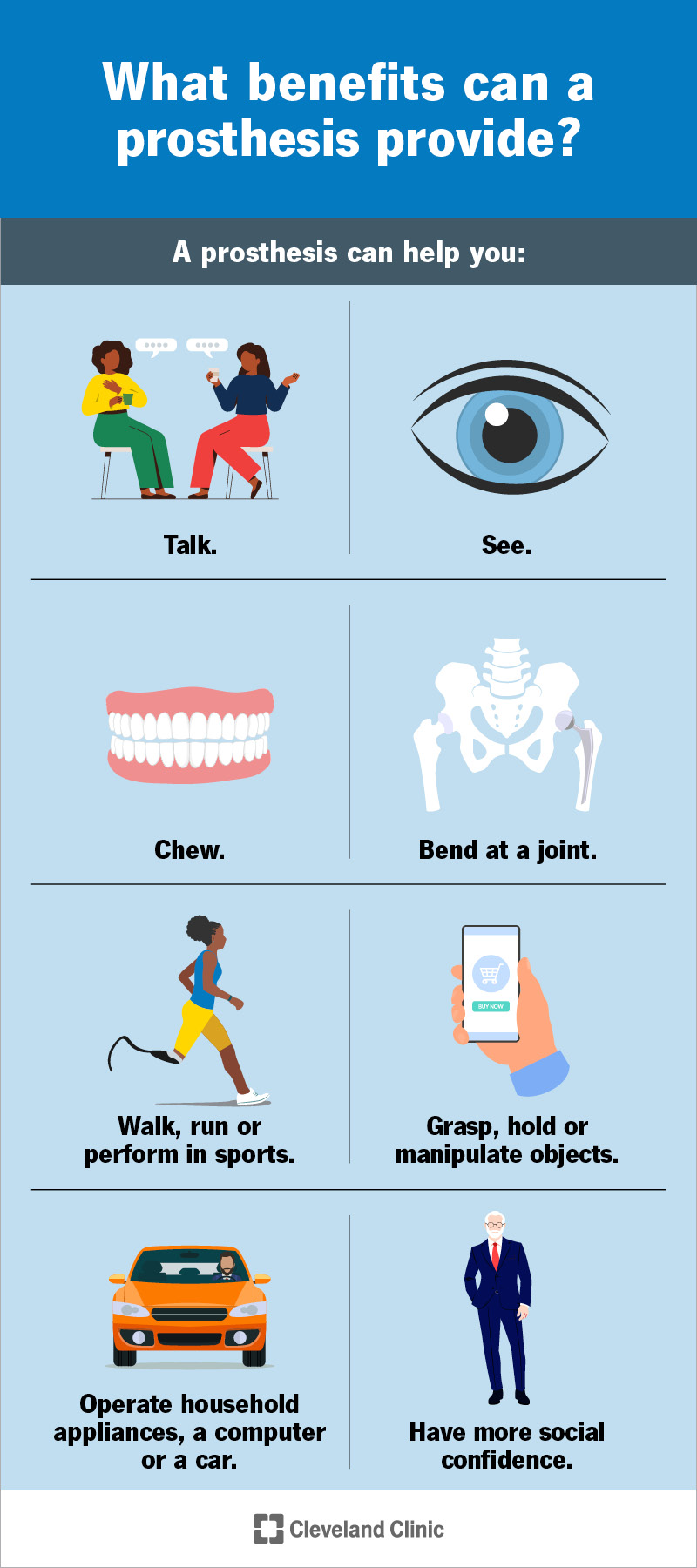A prosthesis is an artificial body part that replaces a part that’s missing or no longer functional. You might use a prosthesis if you’ve lost a body part to injury or disease, or you were born without one. A prosthesis can be an external part that you wear during the day and remove at night — like a prosthetic limb. It can also be an internal implant or device.
Advertisement
Cleveland Clinic is a non-profit academic medical center. Advertising on our site helps support our mission. We do not endorse non-Cleveland Clinic products or services. Policy

Image content: This image is available to view online.
View image online (https://my.clevelandclinic.org/-/scassets/images/org/health/articles/prosthesis-infographic-r1)
A prosthesis is an artificial replacement part for your body. It replaces a part that’s missing or no longer working as you need it to. That’s the broadest definition of a prosthesis: It includes external body parts, like limbs, as well as internal parts and devices, like a mechanical heart valve or joint replacement.
Advertisement
Cleveland Clinic is a non-profit academic medical center. Advertising on our site helps support our mission. We do not endorse non-Cleveland Clinic products or services. Policy
Many people who use the term “prosthesis” are referring to an artificial part that they wear during the day and remove at night. If you wear a prosthesis, it affects your everyday lifestyle. You’ve had to learn how to put it on and remove it, how to function with it and how to clean and care for it as a body part.
The medical specialty that deals with prostheses is called prosthetics. “Prosthetic” is also an adjective to describe a prosthesis, as in, “a prosthetic limb,” “a prosthetic implant” or “a prosthetic device.” “Prosthetics” sometimes substitutes for “prostheses” as a plural noun, meaning “prosthetic parts.”
Many people think of a prosthesis as an external, removable body part, such as:
But prostheses also include internal replacement parts and devices, such as:
Advertisement
You might benefit from a prosthesis if you were born without a body part or lost it to an injury or disease. Sometimes, an internal body part stops functioning well, and a prosthesis can replace it as well as, or better than, a transplant. Some reasons why you might need or want a prosthesis include:
Some prostheses are mainly cosmetic. They replace noticeably missing parts so you look more like those around you. Other prostheses have mechanical functions that can replace the functions of your missing or malfunctioning part. They can bring more ease and self-sufficiency to your everyday life.
A prosthesis can help you:
Adapting to a prosthesis is no small matter — it takes time and effort, not to mention the cost. And since most prosthetics have a limited lifespan, you may have to go through this process more than once. Some people might have less to gain from all this than others, depending on their conditions and goals.
Potential risks or downsides to getting a prosthesis might include:
If you’re considering a prosthesis, you’ll have a lot to think about, and you may not have a lot of time to do so. This can feel overwhelming, especially when the stakes feel very high. Some types of prostheses have many options to choose from. You might also have alternative treatment options to consider.
Advertisement
At this moment, it helps to remember that there’s a community of caregivers and others living with prosthetics who know this landscape well. Spend a little time browsing online and discussing important details with your inner circle. As these details become clearer, so will your own priorities and needs.
Advertisement
Learn more about the Health Library and our editorial process.
Cleveland Clinic's health articles are based on evidence-backed information and review by medical professionals to ensure accuracy, reliability, and up-to-date clinical standards.
Cleveland Clinic's health articles are based on evidence-backed information and review by medical professionals to ensure accuracy, reliability, and up-to-date clinical standards.
From sudden injuries to chronic conditions, Cleveland Clinic’s orthopaedic providers can guide you through testing, treatment and beyond.
